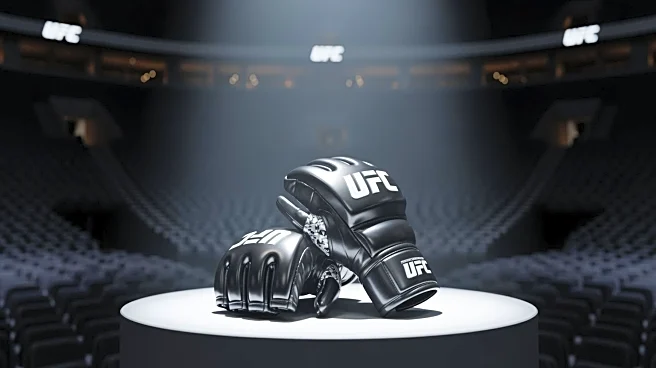What's Happening?
UFC executive director Dana White has reacted to heavyweight champion Tom Aspinall's recent comments about potentially vacating his title. Aspinall expressed his willingness to give up the championship
rather than fight his friend and teammate Ante Delija. White, quoted by TNT Fight Sports, expressed his disapproval of Aspinall's stance, emphasizing that many fighters have competed against friends and relatives in the past. He stated that such decisions are personal and up to the individual fighter. Aspinall is scheduled to defend his title against Ciryl Gane at UFC 321 in Abu Dhabi on October 25. Aspinall's last fight was a knockout victory against Curtis Blaydes in July 2024, while Gane's most recent bout was a split decision win over Alexander Volkov in December 2024.
Why It's Important?
Aspinall's decision to potentially vacate his title rather than fight a friend highlights the personal dilemmas athletes face in competitive sports. This situation underscores the complexities of maintaining personal relationships while pursuing professional goals. For the UFC, such decisions can impact match-making and title defenses, potentially affecting the organization's scheduling and promotional strategies. Aspinall's stance may influence other fighters who face similar situations, prompting discussions about the balance between personal ethics and professional obligations. The outcome of Aspinall's upcoming fight against Gane could further shape the heavyweight division's dynamics, affecting rankings and future title opportunities.
What's Next?
Aspinall's upcoming title defense against Ciryl Gane will be a pivotal moment in his career, potentially influencing his decision to vacate the title. Should Aspinall win, he may face increased pressure to reconsider his stance on fighting Delija. Conversely, a loss could simplify his decision to step away from the title. The UFC may need to address the implications of fighters choosing not to compete against friends, possibly revisiting policies or offering guidance on such matters. Stakeholders, including fans and sponsors, will be watching closely to see how this situation unfolds and impacts the sport's landscape.
Beyond the Headlines
Aspinall's situation raises broader questions about the ethical considerations athletes face in competitive environments. The decision to prioritize personal relationships over professional achievements can reflect deeper values and cultural norms within sports communities. This scenario may prompt discussions about the role of friendship and loyalty in sports, potentially influencing how athletes navigate their careers. Additionally, the UFC's response to such dilemmas could set precedents for handling similar situations in the future, shaping the organization's approach to athlete management and competition ethics.










